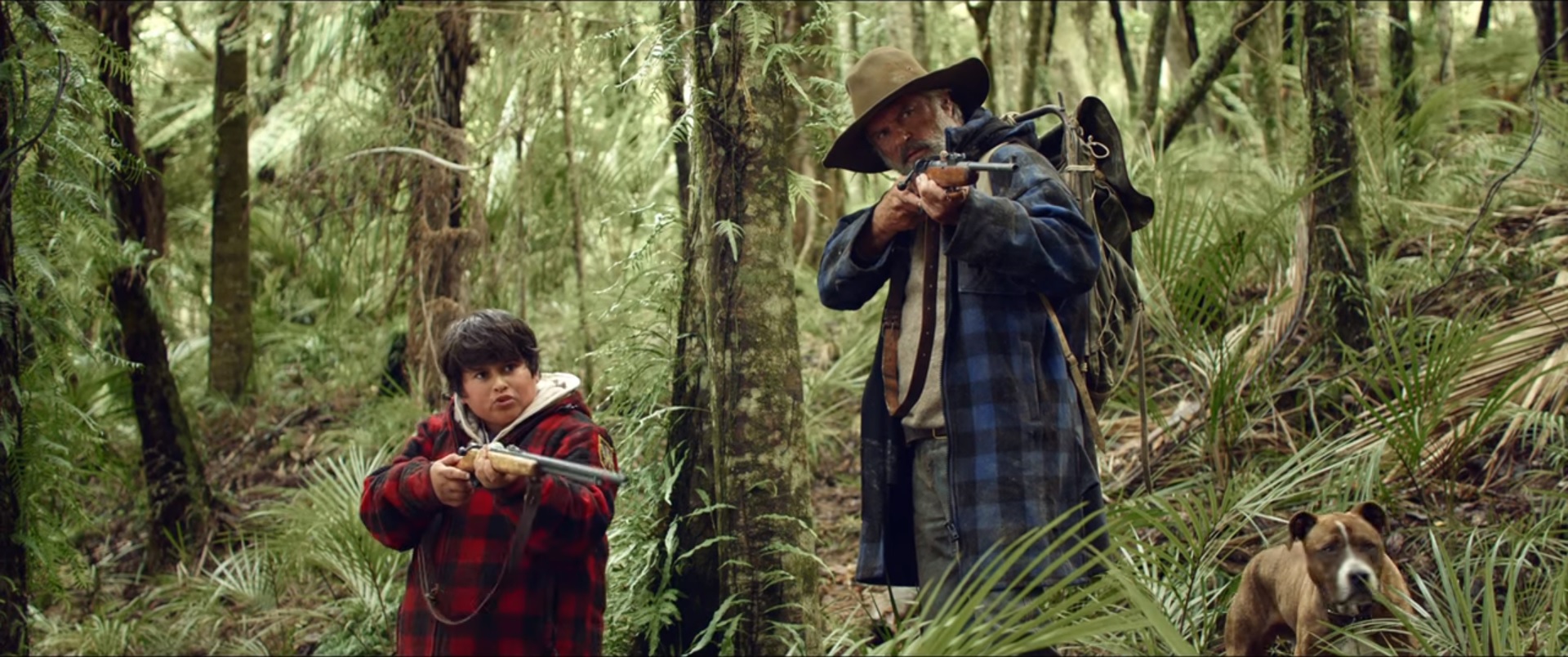Stylistically compelling and drenched in golden light, “Hunt for the Wilderpeople,” written and directed by New Zealander Taika Waititi, is funny, entertaining and sneakily profound. Waititi did the adaptation of the popular Barry Crump novel “Wild Pork and Watercress” and sensed the multilayer appeal of the material, its adventure-story components, fairy-tale structure, and humor. “Hunt for the Wilderpeople” is about two misfits in modern society, a rough bushman known as Uncle Hec (Sam Neill), and a 12-year-old Maori kid named Ricky Baker (Julian Dennison). Ricky has been bounced around in the “system” so much that the system has given up on him entirely.
Why this unlikely pair is thrown together is not as important as the relationship created between the two. Uncle Hec takes “cranky” to new levels, reaching an almost nihilistic rejection of society itself. Ricky, at first, is a silent unpleasant child, lumbering around as adults tell him what to do, talking about him as though he is not there. (Paula, the child welfare service representative, played by the absolutely hilarious Rachel House, looks upon Ricky as a lost cause.) Ricky runs away from every foster family who takes him in, until he finally lands in a cottage right out of a fairy-tale, complete with magical smoke rising from the chimney. There is kindly Aunty Bella (the always-excellent Rima Te Wiata) and her husband, Uncle Hec, first seen coming up over the hill, a dead wild boar slung over his shoulder. Eventually, Uncle Hec and Ricky, who snipe at one another like old grizzled war buddies, take off into the thick bush together. A nationwide manhunt for them ensues, the nation watching agog on television.
The bonding between these two staunchly independent weirdos, rejected by society as though they are a virus, is presented with little to no sentimentality and a commitment to the humor of any given moment. Uncle Hec’s blunt and sometimes cruel barbs don’t hurt Ricky. On the contrary, they relax him. Ricky is used to being lied to, kicked around, treated with indifference. He knows authenticity when he sees it. Ricky has many random interests: He loves haikus, composing them as he counts syllables off with his fingers. He believes he has a future as a hip-hop artist. He uses self-help speak, a result of his years in the system. (At one point, Ricky suggests that the gloomy Uncle Hec needs time to “process his emotions.”)
Waititi switches back and forth between Hec and Ricky’s rough journey through the bush and the gathering forces of law enforcement amassing behind them. (Paula seems to be under the impression that she’s a member of a SWAT team: she wears riot gear and shouts instructions into a megaphone. Her bumbling partner has to remind her that she is not a cop.)
“Hunt for the Wilderpeople” includes all the entertaining genre tropes from “outlaw” films (“Thelma and Louise,” “Butch Cassidy and the Sundance Kid,” “Bonnie and Clyde,” “Badlands“). The story is told mostly through the eyes of a 12-year-old boy who suddenly clicks into life on its own terms as he hunts for things in the bush, or falls in love with a teenage Maori girl on horseback who gives him shelter for a night. Julian Dennison as Ricky is one of the funniest children on film in recent memory. Ricky may be a victim of circumstances, but in his mind he is Tupac, he is a superhero, he is Rambo.
Hec and Ricky’s journey takes on proportions similar to John Ford’s “The Searchers,” or Maurice Sendak’s “Where the Wild Things Are,” strange comparisons, perhaps, but both are stories of treks into the wild that have the potential to change the participants’ lives forever. Lachlan Milne, cinematographer, films the bush, its trees, its hills, its light, with a sense of the epic, the beautiful, the transformative.
Waititi, whose “Boy” was the highest-grossing New Zealand film ever, knows exactly what he is doing. Watch the opening sequence when Paula drops Ricky off with Aunty Bella and Uncle Hec. The language about Ricky is brutal, but the scene is deliriously funny (a lot of the credit for that must go to editors Yana Gorskaya, Luke Haigh, and Tom Eagles, who also edited Waititi’s vampire mockumentary “What We Do in the Shadows.”) The editing tells us how we should “take” this strange story, and that opening sequence orients the audience in tone and mood. The mood is sustained throughout and it’s a mixture of profundity and tenderness, crankiness and humor. When those various strains converge, “Hunt for the Wilderpeople” is poignant in a way that other more manipulative films never achieve.
It’s common to take for granted the excellence of an actor like Sam Neill. Since the moment he arrived on the scene, he has shown that he is incapable of falseness or shallow-ness of conception. He approaches his characters with an utter lack of condescension. He elevates projects just by appearing in them, and the same is true here. One of the intense pleasures of “Hunt for the Wilderpeople” is the dynamic between the experienced Neill and the young untried kid-actor. Neill isn’t doing a “star turn”: the film is a pure two-hander. Neill is pained, ferocious, blunt, and treats Ricky like an equal, even when it might be better to remember that Ricky is only 12 years old. You believe, without a shadow of a doubt, that Uncle Hec could survive for months in the bush. Or anywhere.
Waititi films much of this like a fairy-tale or an adventure story: small cottages in the middle of the forest, hills covered in impenetrable green trees, misty mornings, gentle-blue twilights with two hearty figures climbing up a hill, black silhouettes against the sky. The film is epic. It’s fun. It’s very human. When strong emotions come up, it’s powerful because of the stark contrast with the rough language, the rough emotions and humorous anti-sentimentality of the rest. Without trying to tell a powerful story, Waititi has done just that.












